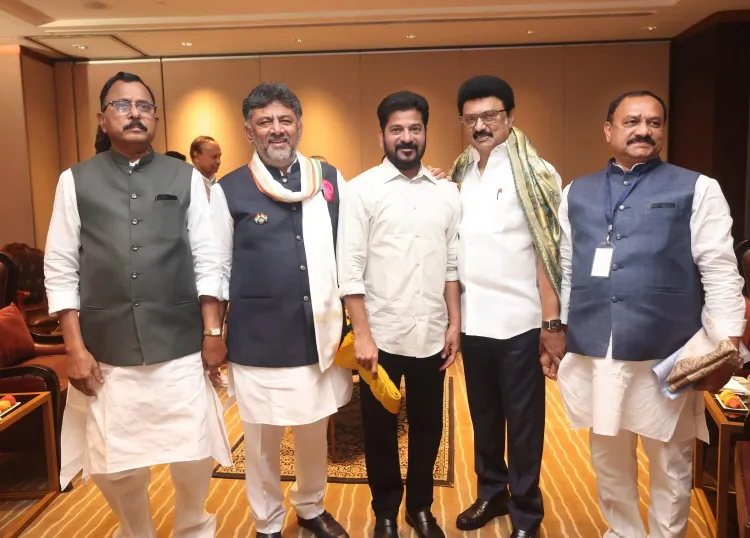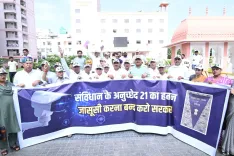Delimitation Debate: Progressive States Opt for Resistance, Says Shivakumar

Synopsis
Key Takeaways
- Shivakumar calls for unity among progressive states.
- The delimitation process threatens federal balance.
- Southern states contribute significantly to India's economy.
- Demand for a fairer representation based on governance quality.
- Call for establishing a National Language Rights Commission.
Bengaluru, March 22 (NationPress) Karnataka's Deputy Chief Minister D.K. Shivakumar spoke at a Joint Action Committee (JAC) gathering, proclaiming that Karnataka, Tamil Nadu, and every other progressive state here faces a crucial decision: either succumb to dominance or stand in defiance. We choose defiance.
He addressed the assembly, which included Tamil Nadu Chief Minister M.K. Stalin and other prominent leaders from Tamil Nadu, Kerala, Andhra Pradesh, Telangana, Punjab, Odisha, and West Bengal in Chennai.
“This is not merely a North-South confrontation. It is a struggle to reclaim India's vision as a federation of equitable states. Let us come together to assert our rights,” emphasized Shivakumar.
Shivakumar stated, “The delimitation process is not merely about parliamentary representation; it concerns the future of federalism in India. If the Centre continues with this unjust formula, it will disrupt the federal equilibrium, granting excessive power to states that have not managed population growth effectively. This will not only marginalize the southern states but also undermine the cooperative federalism principles enshrined in our Constitution.”
“To the Union Government, we convey this unequivocal message: Karnataka, Tamil Nadu, Kerala, and all progressive states will not be silenced. We are prepared to defend our rights, resources, and identity in courts, Parliament, and on the streets,” he declared.
Shivakumar further urged, “Let us channel the defiance of Periyar, the statesmanship of Annadurai, and the passion of Basavanna. When Karnataka and Tamil Nadu unite, no force can divide us. When Kerala and Punjab raise their voices, the Himalayas will quake.”
He remarked that the 15th Finance Commission’s population-based formula has already had severe repercussions. If the delimitation proceeds as anticipated, our political representation will diminish, crippling our ability to advocate for our rights in Parliament.
“This struggle transcends mere numbers; it embodies our identity, culture, and heritage. Karnataka takes pride in its 1,500-year-old literary legacy, from the Vachanas of Basavanna to Kuvempu's works. Tamil Nadu’s Sangam poetry, Kerala’s classical arts, and Andhra’s Telugu heritage are not just regional assets—they represent the essence of India,” stated Shivakumar.
However, the Centre’s relentless push for “One Nation, One Language” threatens to erase this diversity, he argued.
From railway signboards to competitive exams, the imposition of Hindi undermines our linguistic and cultural sovereignty. Let it be clear: Kannada, Tamil, Telugu, Malayalam, and other regional languages are not merely dialects; they are the essence of our civilizations, he asserted.
At the start of his address, Shivakumar expressed, “Friends, we gather here at a pivotal moment in India’s history. The very foundation of our democracy—federalism—is endangered. The essential pillars of our federal democracy, as established by Babasaheb Ambedkar and the visionary architects of our Constitution, are being dismantled piece by piece.”
The suggested delimitation exercise, based solely on population, is not merely a technical adjustment; it is a political assault on the southern states, he emphasized.
“It aims to penalize us for our achievements in population control, enhancing literacy, and empowering women,” noted Shivakumar.
Karnataka, Tamil Nadu, Kerala, and other southern states have significantly contributed to India’s progress. “We have prioritized education, healthcare, and sustainable growth. Yet, the Centre now intends to diminish our parliamentary representation, effectively silencing our voices in the national dialogue. This is not only unjust—it is a betrayal of the constitutional commitment that development and good governance should be rewarded, not punished,” Shivakumar stated.
“Here are some hard facts: Karnataka contributes over Rs 4 lakh crore to the Centre’s Gross Tax Revenue annually. Yet, what do we receive in return? A paltry Rs 45,000 crore in tax devolution and Rs 15,000 crore in grants. For every rupee Karnataka contributes, only 13 paise returns to us. This is not merely an economic injustice; it is a systematic plundering of our resources,” he asserted.
“Karnataka, with just 5 percent of India’s population, contributes 8.4 percent to the national GDP. We are the top GST contributors in the nation. Southern states, which generate 35 percent of India’s GDP, are treated as ATM machines for the North. Yet, our share of central funds remains disproportionately minimal,” he emphasized.
The Karnataka Legislative Assembly has unanimously passed a resolution rejecting any delimitation process based on the new census. We demand that the 1971 Census remain as the basis for delimitation, as it rewards states for their successful population control and sustainable development efforts, he stated.
Shivakumar called for delimitation justice: a weighted formula that considers human development indices, tax contributions, and population management. Representation must reflect governance quality, not just population.
“Firstly, implement a floor limit on parliamentary seats for states that have effectively managed their population. This will ensure that their voices are not marginalized. Secondly, the ‘Bicameral Balance’. Strengthen the Rajya Sabha as a counterbalance to the Lok Sabha. Empower it with greater legislative authority and a structured role in economic decision-making to ensure that developed states are not sidelined,” he advised.
Thirdly, he advocated for a new fiscal federalism agreement that guarantees fair tax devolution and resource sharing. The 16th Finance Commission must prioritize equity, efficiency, and performance, Shivakumar insisted.
He urged the Centre to include economic and social indicators in resource allocation. Central fund distributions should consider economic performance, fiscal discipline, and governance quality.
Shivakumar insisted on establishing a National Language Rights Commission to uphold the equality of all scheduled languages and to pass state resolutions mandating the use of regional languages in Central institutions, including banks, railways, and competitive exams.
“Fifthly, ensure unity through collaboration. Strengthen the JAC as a permanent coalition to coordinate legal, legislative, and grassroots advocacy,” he appealed.
Today, let this JAC convey a powerful message to the nation: We will not permit our voices to be muted, our resources to be exploited, or our cultures to be erased. Together, we shall strive to restore the federal promise of India—a union where diversity is celebrated and equality is upheld. I also concurred with Reventh Reddy's suggestion that we may pursue legal action as well.






